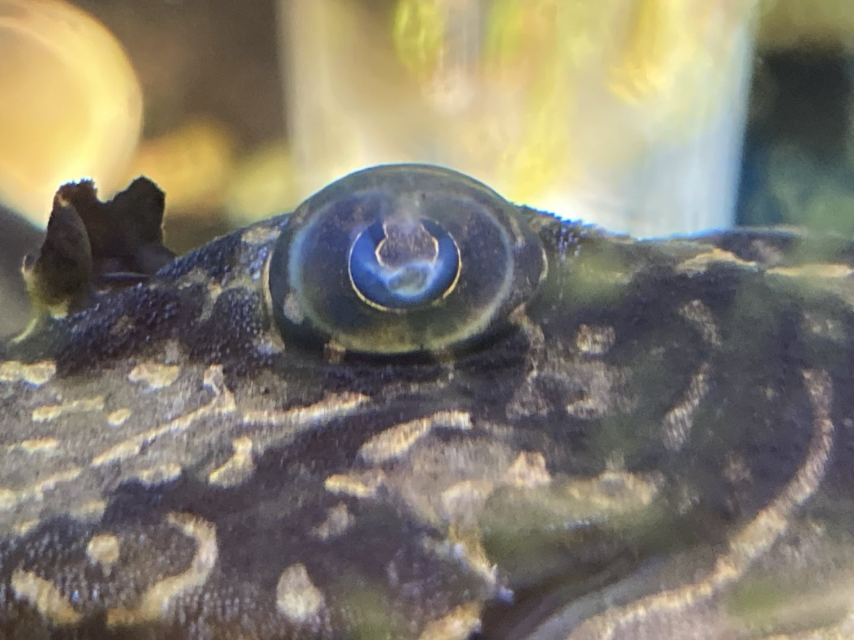This paper says that Pterygoplichthys ambrosettii (a relative of your L001) only uses abdominal breathing during the day if it's under anoxic conditions. In addition, apnea (i.e. inability to breathe) is associated with the following:
These are almost exactly the symptoms you describe, so the fish, for whatever reason, is finding the water not aerated enough to breathe... but clearly he is also capable of gill breathing to come extent, and switches to it when more oxygen is needed (e.g. while foraging or eating).
Maybe try a powerhead that directs surface water to the bottom of the tank? Most of the air exchange provided by an airstone occurs at the surface, so it's possible that the bottom of the tank has some anoxic pockets. If you provide more flow, you might be able to reverse the apnea. Gill damage is another possibility, although it's unlikely to be caused by flukes, since (as duanes says) you'd have to add a carrier fish to the tank for that to happen.
I would not worry too much about the "coughing". It's probably because the loricariid breathing organ is an expanded chamber of the stomach, so he needs to adjust the air pocket after a gulp (you can sometimes see bubbles coming off the gills or mouth for the same reason). Even cories show similar behavior.
The cloudy eyes, however, are a cause for worry, and the recommended treatment is pristine water - so please do keep up with the water changes.
In any case, it's clear that this fish is precious to you, so good luck treating him.
Under these conditions, most fish exhibited apnea that can be described as a sequence of the following events: (1) closing opercula, (2) lip protrusion, (3) pulsating movements of the mouth for nearly 20 s forcing the water to enter and to leave exclusively through the mouth, and (4) complete closure of the mouth. When fish were submitted to acute hypoxic conditions (PwO2 = 20 mmHg), during the day, 70 % of the fish exhibited air breathing behavior at a frequency of 4 ± 1 breaths per hour.
These are almost exactly the symptoms you describe, so the fish, for whatever reason, is finding the water not aerated enough to breathe... but clearly he is also capable of gill breathing to come extent, and switches to it when more oxygen is needed (e.g. while foraging or eating).
Maybe try a powerhead that directs surface water to the bottom of the tank? Most of the air exchange provided by an airstone occurs at the surface, so it's possible that the bottom of the tank has some anoxic pockets. If you provide more flow, you might be able to reverse the apnea. Gill damage is another possibility, although it's unlikely to be caused by flukes, since (as duanes says) you'd have to add a carrier fish to the tank for that to happen.
I would not worry too much about the "coughing". It's probably because the loricariid breathing organ is an expanded chamber of the stomach, so he needs to adjust the air pocket after a gulp (you can sometimes see bubbles coming off the gills or mouth for the same reason). Even cories show similar behavior.
The cloudy eyes, however, are a cause for worry, and the recommended treatment is pristine water - so please do keep up with the water changes.
In any case, it's clear that this fish is precious to you, so good luck treating him.




